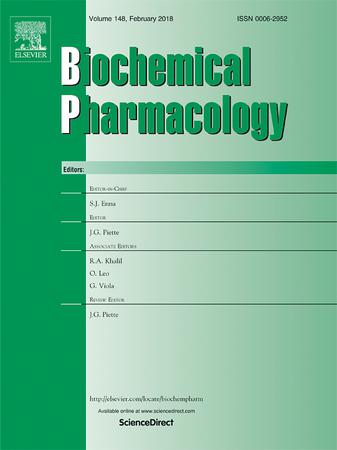MyD88抑制剂TJ-M2010-5通过抑制巨噬细胞诱导的代谢性炎症来预防小鼠肥胖。
IF 5.6
2区 医学
Q1 PHARMACOLOGY & PHARMACY
引用次数: 0
摘要
代谢性炎症是加重肥胖和胰岛素抵抗的重要环节,巨噬细胞的M1极化是代谢性炎症产生和维持的关键。toll样受体4 (TLR4) /髓样分化因子88 (MyD88)信号通路作为炎症调节剂,在巨噬细胞M1极化中起重要作用。我们之前已经证明TJ-M2010-5是一种新的MyD88抑制剂。然而,MyD88抑制剂TJ-M2010-5对高脂饮食(HFD)诱导的肥胖的保护作用及其机制尚未见报道。本研究发现,TJ-M2010-5可显著改善HFD小鼠的体重、血糖和血脂水平。组织学上,TJ-M2010-5减轻了肝脏和脂肪组织的脂质沉积。TJ-M2010-5干预后,HFD小鼠肝脏和附睾脂肪组织中M1巨噬细胞比例、TLR4、MyD88蛋白水平及核因子-κB (NF-κB)磷酸化比例均降低。在体外,TJ-M2010-5抑制骨髓源性巨噬细胞(bone marrow-derived macrophage, BMDM)中TLR4和MyD88的激活,显著降低BMDM中M1极化的比例。TJ-M2010-5通过抑制TLR4/MyD88通路,缓解巨噬细胞M1极化和代谢性炎症,改善HFD诱导的肥胖及其相关糖脂代谢异常。本文章由计算机程序翻译,如有差异,请以英文原文为准。

The MyD88 inhibitor TJ-M2010-5 protects against obesity in mice by suppressing macrophage-induced metabolic inflammation
Metabolic inflammation is an important link in exacerbating obesity and insulin resistance, and the M1 polarization of macrophages is the key to the generation and maintenance of metabolic inflammation. As an inflammatory regulator, the toll-like receptor 4 (TLR4) / myeloid differentiation factor 88 (MyD88) signaling pathway plays an important role in the M1 polarization of macrophages. We previously proved that TJ-M2010-5 is a novel MyD88 inhibitor. However, the protective effect and underlying mechanisms of the MyD88 inhibitor TJ-M2010-5 against obesity induced by high fat diet (HFD) have not been reported. This study revealed that TJ-M2010-5 significantly improved the body weight, blood glucose and lipid levels of HFD mice. Histologically, TJ-M2010-5 alleviated lipid deposition in liver and adipose tissue. The proportion of M1 macrophages and the protein levels of TLR4, MyD88 and the phosphorylation ratio of nuclear factor-κB (NF-κB) in liver and epididymis adipose tissue of HFD mice were decreased after TJ-M2010-5 intervention. In vitro, TJ-M2010-5 inhibited the activation of TLR4 and MyD88 in bone marrow-derived macrophage (BMDM), significantly reduced the proportion of M1 polarization of BMDM. TJ-M2010-5 can improve obesity and its related glucose and lipid metabolism abnormalities induced by HFD through alleviating M1 polarization of macrophages and metabolic inflammation via inhibiting TLR4/MyD88 pathway.
求助全文
通过发布文献求助,成功后即可免费获取论文全文。
去求助
来源期刊

Biochemical pharmacology
医学-药学
CiteScore
10.30
自引率
1.70%
发文量
420
审稿时长
17 days
期刊介绍:
Biochemical Pharmacology publishes original research findings, Commentaries and review articles related to the elucidation of cellular and tissue function(s) at the biochemical and molecular levels, the modification of cellular phenotype(s) by genetic, transcriptional/translational or drug/compound-induced modifications, as well as the pharmacodynamics and pharmacokinetics of xenobiotics and drugs, the latter including both small molecules and biologics.
The journal''s target audience includes scientists engaged in the identification and study of the mechanisms of action of xenobiotics, biologics and drugs and in the drug discovery and development process.
All areas of cellular biology and cellular, tissue/organ and whole animal pharmacology fall within the scope of the journal. Drug classes covered include anti-infectives, anti-inflammatory agents, chemotherapeutics, cardiovascular, endocrinological, immunological, metabolic, neurological and psychiatric drugs, as well as research on drug metabolism and kinetics. While medicinal chemistry is a topic of complimentary interest, manuscripts in this area must contain sufficient biological data to characterize pharmacologically the compounds reported. Submissions describing work focused predominately on chemical synthesis and molecular modeling will not be considered for review.
While particular emphasis is placed on reporting the results of molecular and biochemical studies, research involving the use of tissue and animal models of human pathophysiology and toxicology is of interest to the extent that it helps define drug mechanisms of action, safety and efficacy.
 求助内容:
求助内容: 应助结果提醒方式:
应助结果提醒方式:


